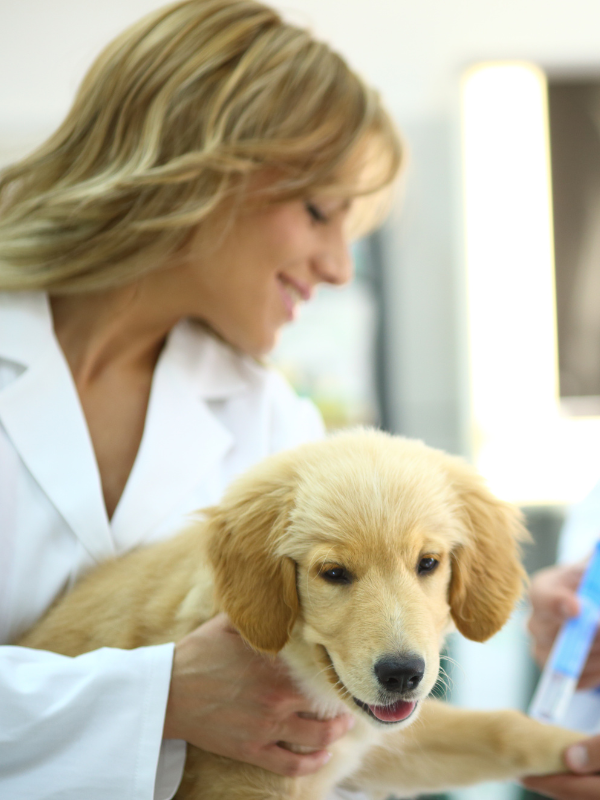737-215-3211

A Comprehensive Guide to Preventing Common Puppy Illnesses
Being a new puppy parent brings immense joy, but it also comes with a significant responsibility - one of them being health care. The young age of puppies, just like with human babies, makes them vulnerable to various health issues. This article will serve as your comprehensive guide to preventing common puppy illnesses, ensuring your puppy grows into a healthy, robust, and happy dog.
Understanding the Immune System of Puppies
Puppies, like all young creatures, have an underdeveloped immune system at birth. They acquire immunity from their mother's milk during the first few weeks, but this gradually decreases, leaving them susceptible to various diseases. Understanding how a puppy’s immune system develops and the factors affecting it is crucial in preventing common puppy illnesses.
How Puppies’ Immune Systems Develop
Puppies obtain their first line of defense against illnesses from their mother's milk, known as colostrum. Colostrum is rich in antibodies that provide passive immunity to the newborn. However, this immunity fades over time, typically between 6 to 16 weeks of age, leaving the puppy vulnerable to diseases. This period is when vaccinations play a vital role in providing active immunity to the young pup.
Factors Affecting a Puppy's Immunity
Several factors influence a puppy's immunity, including diet, environment, stress, and genetics. A well-balanced diet ensures they get the necessary nutrients to develop a robust immune system. A clean and safe environment prevents exposure to harmful pathogens. Stressful conditions can weaken their immune system, making it crucial to provide a calm environment. Lastly, certain breeds may have genetic predispositions to specific diseases, necessitating more targeted care and prevention strategies.
Most Common Puppy Illnesses
Puppies can be susceptible to a wide range of illnesses, but some are more common than others. By understanding these diseases, their symptoms, and prevention strategies, you can significantly reduce your puppy's risk of falling sick.
Parvovirus
Parvovirus is a highly contagious viral illness that can be fatal, especially in puppies. It primarily affects the puppy's gastrointestinal tract but can also harm the heart muscles in very young puppies. Symptoms include lethargy, severe vomiting, loss of appetite, and bloody diarrhea. Prevention primarily relies on vaccination and avoiding areas where an infected dog may have been until the puppy is fully vaccinated.
Distemper
Distemper is another highly contagious and often fatal viral disease in puppies. It affects the respiratory, gastrointestinal, and nervous systems, leading to a wide range of symptoms. Early symptoms include fever, loss of appetite, and mild eye inflammation, which progress to neurological symptoms like seizures. Vaccination is key to preventing distemper.
Kennel Cough
Kennel cough is a term used for inflammation of a puppy’s upper respiratory system. It’s highly contagious and spreads in areas where dogs are in close proximity, like kennels or dog parks. Symptoms include a persistent, forceful cough. Vaccination and hygiene are critical in preventing kennel cough.
Worms
Puppies are commonly affected by worms, including roundworms, hookworms, whipworms, and tapeworms. Symptoms include diarrhea, vomiting, weight loss, and a potbelly. Regular deworming, as recommended by your vet, is crucial in preventing this issue.
Fleas and Ticks
Fleas and ticks are external parasites that can cause various health issues in puppies, including anemia, skin allergies, and tick-borne diseases. Regular flea and tick prevention treatments, along with grooming, can keep these parasites at bay.
Keep Your Dog Healthy With Dog Supplements and More!
Understanding Vaccination for Puppies
Vaccinations play an essential role in preventing common puppy illnesses. They work by introducing a safe form of the disease-causing microorganism, stimulating the puppy's immune system to recognize and fight the disease in the future.
Importance of Vaccinations
Vaccinations provide puppies with active immunity against several potentially deadly diseases. They prepare the pup's immune system to fight off these illnesses effectively. Vaccinations also contribute to herd immunity, protecting other dogs in the community, especially those who can't be vaccinated due to health reasons.
Puppy Vaccination Schedule
Puppies typically start their vaccination schedule around 6 to 8 weeks of age, with subsequent boosters every 3 to 4 weeks until they're about 16 weeks old. This schedule might vary based on the type of vaccine and the puppy's health, so it's crucial to consult with your vet.
Common Side Effects and Care Post Vaccination
Most puppies only experience mild side effects post-vaccination, like slight fever or reduced activity. Some may have soreness at the injection site or a mild decrease in appetite. It's essential to keep a close eye on your puppy post-vaccination and report any concerns to your vet.
Preventing Common Puppy Illnesses Through Hygiene
Maintaining good hygiene is crucial in preventing common puppy illnesses. A clean puppy and environment can significantly reduce the risk of various diseases, including those caused by parasites and bacteria.
Importance of Hygiene
Proper hygiene keeps harmful microbes at bay, reducing the chance of your puppy falling ill. It includes regular grooming, dental care, and keeping the puppy's environment clean.
Grooming Tips and Techniques
Grooming isn't just about keeping your puppy looking good; it also has significant health benefits. Regular brushing keeps the coat and skin healthy, reduces shedding, and gives you a chance to check for any skin abnormalities or parasites. Bathing should be done as necessary, but not too often as it could dry out their skin. Always use puppy-friendly grooming products.
Puppy Dental Care
Dental care is an often-overlooked aspect of puppy care, but dental diseases can lead to severe health issues if not addressed. Start dental care early to get your puppy accustomed to the process. Use a soft toothbrush and puppy-safe toothpaste for daily brushing.
Nutrition for Prevention of Puppy Illnesses
Providing your puppy with balanced nutrition is key to their overall health and disease prevention. A well-fed puppy will have a stronger immune system, healthier skin and coat, and better digestion, among other benefits.
Understanding Puppy Nutrition
Puppies require a different nutritional balance compared to adult dogs, with higher needs for protein, certain fats, and specific minerals for their rapid growth and development. Understanding the basics of puppy nutrition is essential to make informed choices about their diet.
Nutritional Requirements
Puppies need a diet rich in protein for muscle development, fats for energy, and certain minerals like calcium and phosphorus for bone growth. They also need a variety of vitamins for various bodily functions. These needs can be met through a balanced commercial puppy diet, but always consult your vet to ensure your puppy's unique nutritional needs are met.
Diet Tips for Prevention of Diseases
Feeding your puppy a balanced diet can help prevent several diseases. For example, a diet rich in omega-3 fatty acids can help prevent skin diseases, while proper calcium and phosphorus balance is crucial for preventing bone disorders. Avoid overfeeding, as obesity can lead to various health issues.
Importance of Regular Vet Visits
Regular vet visits are essential for preventive care, ensuring your puppy remains healthy and any potential health issues are identified early.
Puppy’s First Vet Visit
Your puppy’s first vet visit is a crucial step in setting them on the path to good health. The vet will perform a thorough physical examination, start vaccinations, and provide guidance on diet, exercise, training, and general care.
Routine Vet Check-ups
After the initial series of vaccinations, puppies should have routine check-ups at least once a year. These visits will include a physical examination, dental check, booster vaccinations, and parasite control. Regular check-ups allow the vet to detect any potential health issues early, improving the prognosis.
Communicating with Your Vet
Maintaining open communication with your vet is crucial. Don't hesitate to ask questions or voice concerns about your puppy's health or behavior. Remember, no question is too trivial when it comes to your puppy's health.
Exercise and Mental Health in Puppies
Physical exercise and mental stimulation play a crucial role in your puppy's health and development. A well-exercised puppy is not only physically healthy but also mentally content, reducing the chances of behavior problems.
Role of Exercise in Puppy Health
Exercise strengthens your puppy's muscles, keeps their weight under control, and improves overall health. It also plays a role in preventing diseases, including some orthopedic issues and obesity-related diseases.
Mental Health and its Impact on Puppy’s Well-being
A mentally stimulated puppy is a happy puppy. Mental stimulation helps prevent behavioral problems like excessive chewing or barking, which can often stem from boredom or anxiety. Training, puzzle toys, and interactive play are all excellent ways to keep your puppy's mind sharp.
Exercise Routines for Puppies
Creating a balanced exercise routine for your puppy is crucial. Puppies need several short play and exercise sessions each day. Remember to keep exercise appropriate for your puppy's age and breed to prevent potential joint issues.
Puppy Socialization and Disease Prevention
Socialization is an essential part of your puppy's early life. Properly socialized puppies are less likely to develop behavioral problems, but it's crucial to do it safely to prevent disease transmission.
What is Puppy Socialization
Puppy socialization involves exposing your puppy to a variety of people, environments, sounds, and other animals in a positive way. It helps them grow into confident and well-adjusted dogs.
Importance of Socialization
Well-socialized puppies are less likely to react fearfully or aggressively to new experiences. This reduces stress, which can negatively impact their immune system and increase disease susceptibility.
Safe Socialization Practices
While socialization is important, it's crucial to do it safely to prevent disease transmission. Avoid dog parks or other areas with unknown dogs until your puppy is fully vaccinated. You can safely socialize your puppy with fully vaccinated dogs and in controlled environments.
Caring for a Sick Puppy
Despite your best efforts, your puppy might still fall ill. Recognizing the signs of illness and knowing when to seek veterinary help is essential.
Recognizing Signs of Illness
Early signs of illness in puppies may include decreased appetite, lethargy, changes in stool, and excessive whining. Being in tune with your puppy's normal behavior will help you recognize when something is off.
When to Seek Veterinary Help
If you notice any signs of illness in your puppy, it's essential to seek veterinary help immediately. Puppies can deteriorate quickly, so it's better to be safe than sorry.
Caring Tips for a Sick Puppy
If your puppy falls ill, provide a quiet and comfortable space for them. Encourage them to eat and drink, and give all medications as prescribed by the vet. Provide plenty of love and reassurance to help your puppy through their illness.
Frequently Asked Questions (FAQs)
What is the most common disease in puppies?
The most common diseases in puppies include parvovirus, distemper, kennel cough, and various worm infestations. Regular vaccinations can protect against most of these diseases.
How can I boost my puppy's immune system?
Feeding a balanced diet, ensuring proper hygiene, avoiding stressful situations, and adhering to the recommended vaccination schedule can all contribute to a strong immune system in puppies.
How often should I take my puppy to the vet?
Your puppy will need to visit the vet several times in their first few months for vaccinations and regular health checks. After that, annual check-ups are usually sufficient unless your puppy falls ill.
What is a safe way to socialize my puppy?
Until your puppy is fully vaccinated, socialize them with fully vaccinated dogs and in controlled environments. Avoid dog parks or other places with unknown dogs.
What should I feed my puppy to keep them healthy?
Feed your puppy a balanced diet specifically designed for puppies. This diet should be rich in protein, have the right balance of fats, and contain all the necessary vitamins and minerals.
What can I do if my puppy falls sick?
If your puppy shows signs of illness, contact your vet immediately. Provide a quiet, comfortable space for your puppy, and follow all treatment instructions given by your vet.
Conclusion
Preventing common puppy illnesses involves a combination of regular veterinary care, proper nutrition, good hygiene, timely vaccinations, and plenty of love. Being a puppy parent may seem daunting at first, but with the right knowledge and resources, it's a rewarding experience. Remember, a healthy puppy is a happy puppy!






Leave a comment